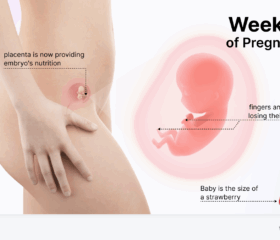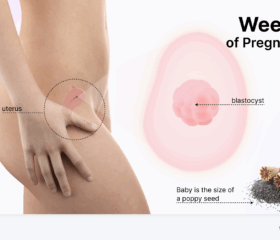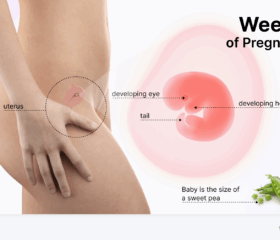Pregnancy Week by Week
21 Weeks Pregnant
Your baby is as big as a carrot.
10.5
inches
12.7
ounces
21 Weeks Pregnant: Symptoms, Baby’s Development, & Tips
Inside your womb, your baby is growing quickly. You’re probably feeling his movements more strongly than ever.
As you progress further into your pregnancy, you might find that your symptoms are less intense than in the first trimester, but remember that every pregnancy is unique, so don’t be alarmed if you’re still struggling a little.
Let’s find out what’s happening with you and your baby this week.
Your baby's development at 21 weeks
That little sweet potato from last week just keeps getting bigger. Your baby now measures around 10.5 inches long and weighs approximately 12.7 ounces. 1 He’s now bigger than the placenta, which previously outweighed him.
Here’s what else is going on with him:
- Movement and coordination: Your baby’s arms and legs are now proportionate to his body, and he has more control over his movements. You might now start to feel your baby kicking, stretching, and maybe even doing the occasional somersault. 2 He’s also developing his reflexes—try gently pressing on your belly, and you might feel a little pushback.
- Sleep patterns: Just like a newborn, your baby is sleeping a lot. He’s developing his own sleep cycle, which—unfortunately—might not sync up with yours. That means your baby could well be at his most active just as you’re trying to get to sleep. 2
- Taste buds: Your baby’s taste buds are developing, and he may even be able to taste the flavors of what you eat in your amniotic fluid. 3
- Skin: While your baby’s skin will eventually become silky smooth, right now, it’s wrinkled, translucent, and appears reddish due to his visible blood vessels. He’s also covered in a fine layer of downy baby hair called lanugo. This helps him keep warm, but it usually falls off before the 37th week of pregnancy. 4
- Blood production: Your baby’s bone marrow is developed enough for it to start making red blood cells. Before, his liver and spleen were responsible for producing it. 5
- Hearing: Your baby can hear sounds like your heartbeat, the rumblings of your digestive system, and maybe even your voice. If you talk, sing, and read to your baby, he may be able to listen, and it’ll help him recognize your voice when he’s out of the womb. 4
- Reproductive development: Your baby is already preparing for kids of his own down the line. If you’re having a girl, her uterus is now fully formed, with enough eggs to last a lifetime. 6

Your body at 21 weeks
As your baby grows, your body is changing too. This week, you might notice some physical changes, such as:
- Stretch marks: Pink, red, purple, or brown streaks may appear on your stomach, breasts, hips, thighs, and buttocks as your skin stretches to accommodate your growing baby. They’re common, especially if your mother had them, and may fade with time after birth.
- Weight gain: You might be gaining around a pound a week. However, everyone’s different, and it’s important to gain the right amount of weight for your body mass index (BMI). Your doctor will let you know what’s right for you. 7
- Fast-growing nails: Pregnancy hormones and increased blood circulation may cause your hair and nails to grow faster.
- Varicose veins: You’re more likely to get varicose veins during pregnancy due to a surge in the hormone progesterone.
- Dry and itchy skin: As your skin stretches, it may become dry and itchy. Lotion can help with this symptom, although probably not defeat it completely.
- Swollen feet and ankles: This one is infamous. Thanks to your body retaining more fluid, you may have to contend with swollen feet during your pregnancy. 8
Unfortunately, you’re also more susceptible to getting sick during your pregnancy, which may cause more serious complications. Make sure you ask your doctor about any vaccinations you need to get (note that you can get the flu shot while pregnant).
Your belly at 21 weeks
At 21 weeks, you’ve probably got a decently sized baby bump to show off. Don’t feel bad about gaining a few extra pounds—embrace your new curves!
Remember that this weight gain is necessary and healthy for your baby’s development. All the weight you gain during pregnancy is going to good use, from providing nutrients for him to storing nourishment for breastfeeding a little further down the line.
Other symptoms at 21 weeks
Each pregnancy is different—you may experience a few of these symptoms, none of them, or maybe even all of them. Common pregnancy symptoms in the 21st week include:
- Increased appetite: Now that you’re hopefully past the days of crippling morning sickness, you may find yourself especially hungry. Don’t be afraid to accommodate your growing appetite—you’ll need an additional 340 calories each day during this trimester. 9
- Heartburn and indigestion: Your hormonal changes, combined with the pressure from your growing baby, may cause you to start experiencing heartburn at this stage of your pregnancy. The pressure from your uterus on your rectum might bring about gas and bloating during your pregnancy, too.
- Backaches: The pregnancy hormone relaxin loosens your joints, and your shifting center of gravity can cause backaches. 10
- Bleeding gums: Those troublesome pregnancy hormones will make your gums more sensitive to plaque, causing you to experience inflammation and bleeding gums during your pregnancy. 11
- Clumsiness: Your changing center of gravity, along with your looser joints, can make you a little clumsy. Be extra careful; avoid activities with a high risk of falling, and get someone to help you with potentially hazardous tasks.
- Brain fog: At this stage, you might start getting the infamous pregnancy brain. You may feel extra forgetful and find it difficult to concentrate. 12 This will probably go back to normal after birth.
- Nasal congestion: Many women also suffer from a stuffy nose during the second trimester, known as pregnancy rhinitis.
While most symptoms at 21 weeks are fairly harmless, it’s a good idea to keep an eye on them. You may find a pregnancy tracker helpful for noting down any new symptoms, in case any of them warrant a visit to the doctor. The best pregnancy trackers also offer advice for managing your logged symptoms.
Understanding Braxton Hicks contractions
At this stage of pregnancy, many women also experience Braxton Hicks contractions. You can think of these as practice runs for the contractions you’ll have when you go into labor, and you might even mistake them as a sign that your baby is coming ahead of schedule.
However, there are differences between labor contractions and Braxton Hicks contractions. Braxton Hicks contractions are usually irregular and painless (although they may feel uncomfortable, like your uterus is “tightening”), and often go away with rest or a change of position. 13
Generally, you don’t need to be concerned about Braxton Hicks contractions, which are normal (and inevitable). That said, call your doctor if:
- You have increasingly frequent and regular contractions that feel very painful.
- They don’t go away after a couple of minutes.
- Any pregnancy discharge or bleeding from your vagina accompanies the contractions.
How to manage your symptoms at 21 weeks
The second trimester is when a lot of those troublesome early symptoms usually clear up, and you probably feel more energetic than during the early days. However, that isn’t to say that this week’s symptoms can’t still be frustrating. Here are some tips to help you navigate week 21:
Stay hydrated
As with every week of your pregnancy, try to stay hydrated. Drink plenty of water, at least 8–12 cups daily, to help with swelling, pregnancy constipation, and even Braxton Hicks contractions (which may get worse when you’re dehydrated). 14
Eat a balanced diet
While it’s fine to give in to your cravings occasionally, in the main, focus on nutritious foods to support your baby’s growth and your own health.
Add iron-rich foods like dark leafy greens, lentils, and lean meats to your pregnancy diet. The importance of iron can’t be understated; the World Health Organization (WHO) recommends that all women take iron supplements throughout pregnancy. 15
Avoid spicy and greasy foods, which may make your indigestion worse, and try eating smaller, more frequent snacks rather than a few huge meals.
Alongside your diet, keep taking your prenatal vitamins to ensure you and your baby are getting the nutrients you need.
Get regular exercise
You need a lot of rest, but staying active is just as important. Light to moderate exercise like walking is one of the best pregnancy workouts out there. There are many benefits of doing prenatal yoga, too. Both can help with circulation, swelling, and your overall well-being.
Swimming is a great way to relieve pressure on your muscles and joints, and the cool water can also ease your stomach woes. Regular walks can help with constipation. Be sure to rest when you need to, and don’t push yourself too hard.
Take time to destress
While pregnancy can be enjoyable, it’s not free from stress. Find ways to relieve stress, such as light exercise, talking to friends or a therapist, and trying out relaxing activities like yoga or meditation. Take time to rest when you need it (doing so with your feet elevated can also help with swelling).
If you really want to treat yourself, why not book a relaxing prenatal massage? Just make sure your masseuse is certified to give them.
Getting an ultrasound at 21 weeks
If you haven’t already, you may have your mid-pregnancy ultrasound this week, also called the anatomy scan. You’ll get to take a good look at your baby and see details like their brain hemispheres and heart chambers. Unless you want to keep it a surprise, you can also find out the sex of your baby!
As such an important milestone in your pregnancy, make sure you get photos to share with loved ones! If your pregnancy remains uncomplicated, this may be the last medical ultrasound you’ll have.
Other important tests
By 21 weeks, you’ve already completed most of your recommended tests and screenings, such as genetic tests and ultrasounds.
However, when you’re between 24 weeks and 28 weeks pregnant, you’ll have a glucose screening to check for gestational diabetes. 16 If your blood glucose levels are too high with the one or two-hour test, you’ll need to go back for a 3-hour glucose tolerance test.
Depending on your pregnancy and risk factors, your doctor may want you to undergo additional screenings.
Final thoughts
You’re now well into the second trimester and haven’t got much longer left before you’re cuddling your baby. Take advantage of that extra energy and set aside some time for yourself to have some fun.
If you’re having your anatomy scan this week, make sure you get those photos of your little bundle of joy. And if you have any lingering doubts or questions, remember that your doctor is always on hand, even if just to reassure you. Enjoy week 21—you deserve it!
Article Sources
- Baby Your Baby. "Fetal Growth Chart" Retrieved June 24, 2025.
- News-Medical. "Pregnancy: 21 - 24 weeks" Retrieved June 24, 2025.
- National Health Service. "Week 22" Retrieved June 24, 2025.
- National Health Service. "Week 21" Retrieved June 24, 2025.
- Nemours KidsHealth. "Pregnancy Calendar: Week 21" Retrieved June 24, 2025.
- Healthdirect Australia. "Pregnancy at week 21" Retrieved June 24, 2025.
- American College of Obstetricians and Gynecologists. "How much weight should I gain during pregnancy?" Retrieved June 24, 2025.
- The University of Texas Southwestern Medical Center. "5 ways to manage swollen legs and feet during pregnancy" Retrieved June 24, 2025.
- Johns Hopkins Medicine. "5 Snack Foods to Eat While Pregnant" Retrieved June 24, 2025.
- Nemours KidsHealth. "What Can I Do to Relieve My Pregnancy Backaches?" Retrieved June 24, 2025.
- National Health Service. "Bleeding gums in pregnancy" Retrieved June 24, 2025.
- The University of Texas Southwestern Medical Center. "Is ‘pregnancy brain’ real or just a myth?" Retrieved June 24, 2025.
- Tommy’s. "Braxton Hicks" Retrieved June 24, 2025.
- American College of Obstetricians and Gynecologists. "How much water should I drink during pregnancy?" Retrieved June 24, 2025.
- World Health Organization. "e-Library of Evidence for Nutrition Actions (eLENA)" Retrieved June 24, 2025.
- Mount Sinai. "Glucose screening tests during pregnancy" Retrieved June 24, 2025.







